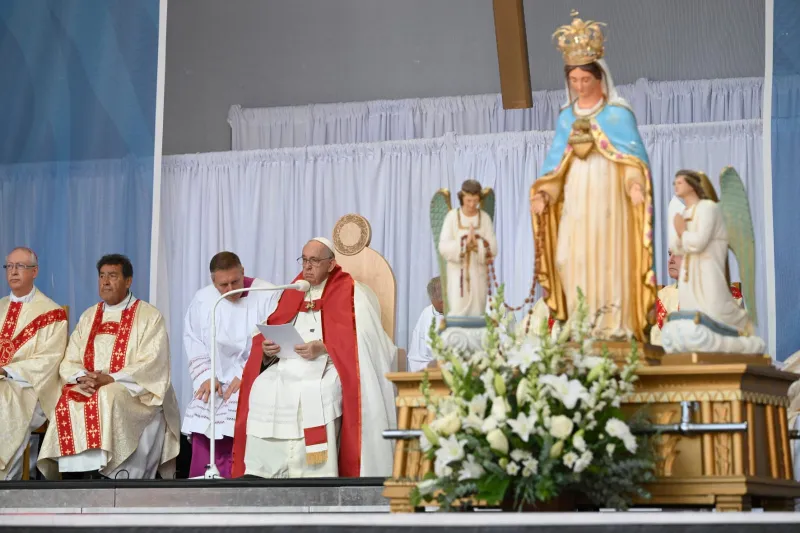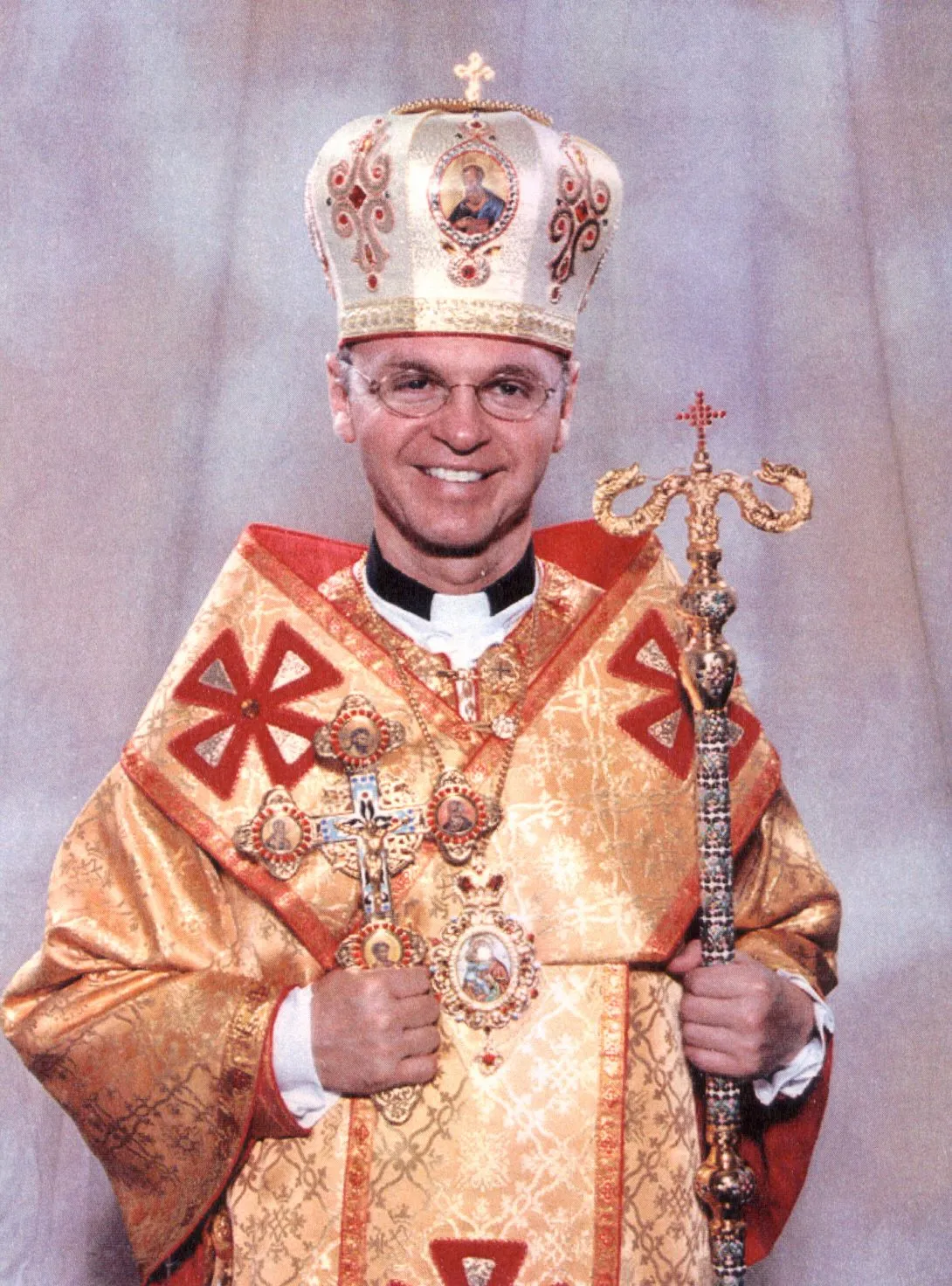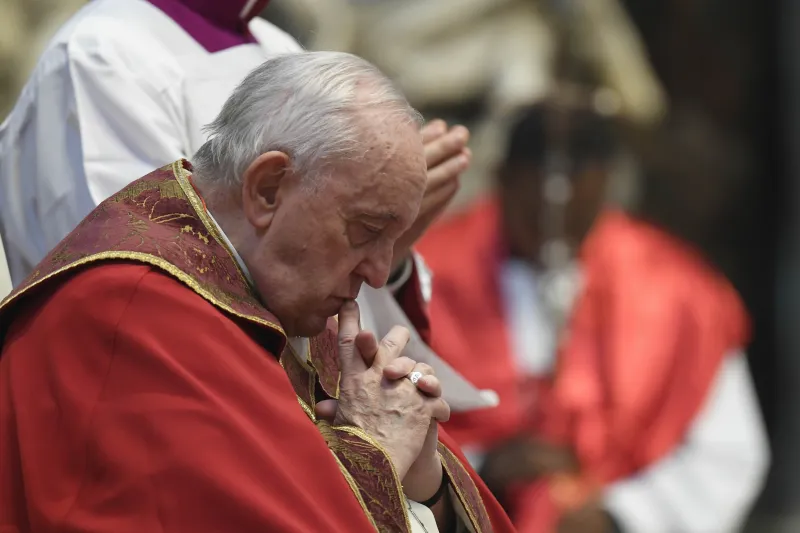
Edmonton, Canada, Jul 27, 2022 / 11:00 am (CNA).
During his “penitential pilgrimage” to Canada, Pope Francis visited Sacred Heart Church, Edmonton’s first parish dedicated to pastoral care for people from the First Nations, Metis, and Inuit communities. Just one block away from this parish is the Ukrainian Greek Catholic Cathedral of St. Josaphat, home to a Ukrainilarge Ukrainian community that began to emigrate to Western Canada 130 years ago.
The history of indigenous peoples in Canada speaks to the plight of Ukrainian immigrants. The situation faced by indigenous peoples bears many similarities to what is now being experienced in Ukraine with Russian aggression, explained Bishop David Motiuk, bishop of the Eparchy of Edmonton.
The context of the Pope’s visit
Bishop Motiuk is a proponent of building a bridge between indigenous peoples and members of the Ukrainian community. In 2021, Bishop Motiuk wrote a powerful letter expressing closeness with indigenous peoples, called “The Bond of our peoples”.
The letter was sparked by vandalism against Calgary’s Catholic parishes following newspaper articles about discovering a mass grave in Kamloops.
Bishop Motiuk wrote: “The Indigenous Peoples in Canada now need our prayers, support, and action as they seek truth and reconciliation regarding the tragedy of Residential Schools. If for no other reason, we can relate to their suffering and loss, for we too know suffering and loss. Millions of our people were starved to death under the Soviet Communist Regime in the Holodomor Genocide of 1932-1933.”
“In Canada, during World War I, thousands of our people were taken away from their families, stripped of all their possessions, and held in some 24 internment camps as enemy aliens, some whose burial sites are still unknown. And since 2014, some 13,000 have died and 30,000 wounded in the ”forgotten war” in eastern Ukraine at the hands of Russian aggressors.”
He shared the same sentiments in his conversation with CNA.
Bishop Motiuk said: “The pope’s visit is very meaningful. He comes to be present as a father. For many years, the Catholic Church, local bishops, and priests have worked for better relations with indigenous peoples. It all begins with listening to each other.”
The issue of residential schools
On the question of residential schools, Bishop Motiuk explained that “at the request of the Canadian government, the Catholic Church and other Christian Churches have provided education within these schools. However, on some occasions, there has not been much understanding of the history and traditions of the local populations. There was a very Western European way of approaching it.”
The Bishop said that Ukrainians “experienced the same thing when we were assimilated: the loss of our language, our culture. Of course, history will judge us where there are challenges, where it has been bad, and where it has been good, but the principle is that we must still start listening to each other, listening to each other’s stories”.

Setting good examples
Bishop Motiuk pointed out that the bilingual Ukrainian school program, which is part of the Catholic school system, has been cultivating an attitude of listening. In these schools, a path of mutual knowledge has been forged between the children of the native populations and Ukrainian children.
“The students told each other the stories of the Holodomor residential schools, the great famine.”
The Holodomor – also known as the Terror-Famine – was perpetrated in Ukraine between 1932 and 1933. It killed between 2.5 and 7 million people.
The stories were told through “songs, presentations, carrying out a path to heal wounds, but through the eyes of children, to enhance the language, faith, traditions of each.”
After all, the experience lived today in Ukraine is one some level similar to that of the indigenous people of Canada, said Bishop Motiuk, because “the indigenous people felt that their traditions would be uprooted, that they would become normal Canadians. And today, in Ukraine, we note that the Russian aggressor’s approach is precisely to uproot a people. It’s the same approach as the Europeans when they arrived in Canada. ”
Instead, he concluded, we must “find the good and beautiful of each one’s gifts.”
Canadian relations with indigenous people
This path of understanding is reinforced by 11 treaties between the Canadian government and the First Nations between 1871 and 1921, establishing that collaboration would be the cornerstone of the relationship between the British Crown (which then ruled Canada) and the Aborigines and to reconcile Aboriginal sovereignty with that assumed by the Crown.
According to Archbishop Lawrence Huculak of the Greek Catholic Metropolis of Winnipeg, “the Bishops of the U.S.A are observing very carefully what we are doing in Canada, and they want to do something similar. There are steps forward, and it will be to see what achievements there will be, but it is certainly a different path because there are other situations. And we are aware that our approach cannot be similar to the European mentality. There are no final answers yet.”
Archbishop Huculak also pointed out that “the First Nations have a lot to tell us about working with nature, working the land, we know they work with the land and have a positive relationship. However, when the Ukrainians have been assimilated, we, too, are struggling with the loss of our identity, and we try to keep ourselves, and we know we have the same struggle, we have to do something, and we have to look at the same strength.”
Developing dialogue between communities
The Ukrainian Greek Catholic Metropolis of Winnipeg also collaborated with the Commission for Ecumenical Dialogue of the Canadian Conference of Catholic Bishops, which explored the future of the dialogue between faiths.
Archbishop Huculak explained that “many of the indigenous people have become Christians and members of the Catholic, Anglican, Orthodox Church.”
At the same time, many other indigenous people “have kept their traditional elements, and it has been a struggle to help understand their demands. Because if you want to have a dialogue with the Orthodox Church, or the Anglican Church, you check the documents they have produced on the issues and start from there to find elements in common. It is not the same for the natives, who have no documents. Rather, they have a strong tradition, rooted and handed down from generation to generation.”
For this reason, for the Catholic Church, it is necessary “to understand what kind of dialogue to do on faith issues, how they understand God, how they understand creation, and it is a challenge for the Church to move forward. Pope Francis has opened this type of dialogue and established a model, but it is something that we must carry on.”
If you value the news and views Catholic World Report provides, please consider donating to support our efforts. Your contribution will help us continue to make CWR available to all readers worldwide for free, without a subscription. Thank you for your generosity!
Click here for more information on donating to CWR. Click here to sign up for our newsletter.





Of at least historic interest for evangelization of the First Peoples is the “Catholic Ladder” developed in what is now Washington State, by Fr. Francis (!) Norbert Blanchet in 1839, and then popularized by the Jesuit (!) Pierre-Jean de Smet, S.J., in 1843.
https://www.marquette.edu/library/archives/News/spotlight/01-2009.php